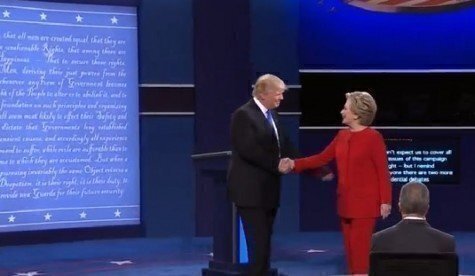Hillary Clinton and Donald Trump discussed many issues at the first fall presidential debate on Monday night, but direct talk about the Constitution was not on the agenda.
 In fact, in more than 90 minutes of talk between the candidates and moderator Lester Holt, the word “constitution” was not spoken once, and the word “unconstitutional” was used twice in reference to stop-and-frisk police-search policies, according to debate transcripts.
In fact, in more than 90 minutes of talk between the candidates and moderator Lester Holt, the word “constitution” was not spoken once, and the word “unconstitutional” was used twice in reference to stop-and-frisk police-search policies, according to debate transcripts.
With record TV and Internet ratings expected for the live event broadcast at Hofstra University, the lively exchanges between the candidates focused on “achieving prosperity, America’s direction and securing America,” as explained by Holt. And according to the debate format, Holt came up with the general questions asked to the candidates.
The debate set did include two images of the Declaration of Independence as backgrounds behind the candidates, but direct discussion of the Constitution was limited to several indirect references.
The primary and brief constitutional issue discussion was about the use of stop-and-frisk policies in Chicago and New York City. Trump spoke about the potential use of stop-and-frisk policing tactics in Chicago during a segment about race relations, when Holt told Trump that “stop and frisk was ruled unconstitutional in New York because it largely singled out black and Hispanic young men.”
Trump countered, saying “No, you're wrong. It went before a judge who was a very against police judge. It was taken away from her and our mayor, our new mayor, refused to go forward with the case. They would have won an appeal.”
The case in question here was Floyd v. City Of New York, a federal court ruling in 2013 from Judge Shira Scheindlin.
Clinton also briefly mentioned the case in her response to Trump. “Stop and risk was found to be unconstitutional. And in part because it was ineffective. It did not do what it needed to do,” she said.
The other issue related to the Constitution was a discussion over Trump’s previous claims that President Barack Obama may not have been born in the United States. Under the Constitution’s Article II, Section 1, the President must be “a natural born Citizen, or a Citizen of the United States, at the time of the Adoption of this Constitution, [to] be eligible to the Office of President.” Trump had questioned Obama’s birthplace since 2011. (Obama’s mother was a United States citizen at the time of his birth – a fact many scholars see as qualifying him to run for President.)
The birth-certificate discussion between the candidates didn’t delve into constitutional issues about the interpretation of the Natural Born Citizen clause.
Also, at the debate’s end, the candidates indicated they would support the outcome of the general election.
The themes of the next two presidential debates have yet to be announced. On October 9, the candidates will meet in a town hall format in Saint Louis, where audience members will ask half of the questions. The final presidential debate is on October 19 in Las Vegas and it will follow the same format as the first debate.






